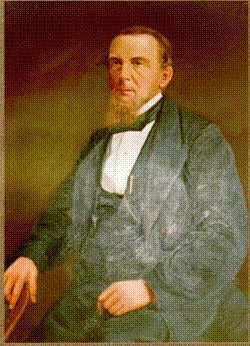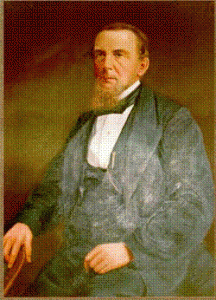William Parkin established the Parkin Trust in 1872 and the Parkin Congregational Mission of South Australia in 1882.
Parkin was born at Glastonbury, Somerset, England on 24th August 1801. By the early 1830s he had settled at Plympton on the outskirts of Plymouth, Devon and on 16th May 1832 married Sarah Mary Carill.
William and Sarah Parkin came to South Australia in the “Recovery” which arrived at Port Adelaide on 19th September 1839. Fellow passengers included James Adamson and his family. Adamson’s eldest son, Adam Adamson, was later one of Parkin’s Executors.
WORK AND BUSINESS
Parkin farmed briefly near Willunga and then opened a drapery in Hindley Street Adelaide on the site later occupied by Miller Anderson’s. By 1852, he had moved to Rundle Street on the site of the Myer store. Robert Stuckey, who was treasurer of Stow Memorial Church from 1873 to 1897, sold the drapery section of his business in Rundle Street to William Parkin and George Williams Chinner in 1852. Chinner was the father of William Bowen Chinner and the grandfather of Norman Chinner who were organists of Pirie Street Methodist Church from 1869 to 1902 and 1939 to 1947 respectively.
By 1858, Parkin was the sole owner of this property which had a 49 foot frontage to Rundle Street. His business prospered and he retired to Plympton and devoted himself to politics. His Plympton house, which originally stood in nine acres of garden is still standing at Lewis Crescent, Plympton North. On 26th February 1878, Joseph Keynes and his wife visited Parkin and wrote “He has a very fine place there”.
Parkin was a member of the House of Assembly (1860-1862), and a member of the Legislative Council (1866-1877). During his “retirement”, he continued many of his business activities: he was a proprietor of the “Advertiser”, chairman of the Wallaroo and Kadina Tramway Company, and a director of the North Terrace-Glenelg Railway line.
CHURCH ASSOCIATIONS
Parkin and his wife became members of the Rev Thomas Quinton Stow’s Freeman Street (now Gawler Place) Chapel “on testimony of the brethren” on 29th May 1845. Parkin conducted a branch Sunday School at Magill, walking both ways. He was a member of the building committee for the “Stow Memorial Church”, now known as Pilgrim Church, which was opened on 12th April 1867, and which replaced the Freeman Street Chapel.
Following the death of his wife Sarah on 23rd March 1871, he married on 28th February 1872 Ellen Stonehouse, the eldest daughter of the Rev George Stonehouse who established the North Adelaide Baptist Church in 1848. Parkin transferred his membership to the Glenelg Congregational Church on 30th April 1873 where he continued as a member until his death on 31st May 1889 aged 87 years. There were no children from either marriage.
Parkin is buried in the West Terrace Cemetery (Road 3, Path 18) and his grave has a fine marble monument which was restored in 2001.
THE PARKIN TRUST INCORPORATED
Parkin established the Parkin Trust in the Declaration of Trust dated 23rd February 1872 and 4th October 1876 by a gift of one thousand pounds in cash (subsequently increased to eight thousand pounds) and about 4160 acres of land in the Northern Territory valued at two thousand pounds. The Deed of Settlement was signed on 11th October 1876 and the Trust was incorporated on 12th October 1876. The main purpose of the Trust was to train Congregational Ministers, but was not to become operative until the income reached one thousand pounds per annum. This took place in 1909, and Parkin College was established in 1910 at North Terrace, Kent Town.
After the death of his wife Ellen in 1925, additional property in Glenelg became the property of the Trust. His total gifts to the Parkin Trust were of the order of twenty thousand pounds.
Parkin College was amalgamated with Wesley College in 1969 in anticipation of the establishment of the Uniting Church, and now forms portion of Parkin Wesley College. The income from the Trust assists the work of Parkin Wesley College.
THE PARKIN CONGREGATIONAL MISSION OF SOUTH AUSTRALIA INCORPORATED
Parkin established the Parkin Congregational Mission of South Australia on 19th September 1882 by a Deed of Settlement. A further Deed of Settlement was approved on 14th September 1887. The Mission was incorporated on 13th January 1888. His gift comprised his Rundle Street property with a 49 foot frontage which was valued at approximately twenty thousand pounds. The Mission became operative on Parkin’s death on 31st May 1889.
The main purposes of the Mission were to:
¨ Pay “annuities of five pounds each to twenty poor God-fearing widows…”
¨ Pay “the stipends of Missionaries of the Congregational denomination appointed by the Governors……….the said Missionaries shall travel in the less settled districts of South Australia, that is to say beyond a distance of twenty miles from any now or hereafter existing Congregational Church.”
The Rundle Street property was sold in 1963 for 410,000 pounds, and the funds of the Mission were reinvested.
The available income of the Mission assists the work of the Uniting Church by grants to the Synod of South Australia for “The payment of grants to congregations, the Patrols and other ministries including Chaplaincies”.
The scope of the Mission has been broadened over the years to cover the new frontiers of ministry which include Chaplaincies. At Church union in 1977, the word “Congregational” was removed from the name of the Mission.
VALUE OF PARKIN’S GIFTS
Parkin’s original gifts amounted to approximately 40,000 pounds ($80,000), 20,000 pounds each for the Trust and the Mission.
The capital value of his gifts at Church union in 1977 amounted to approximately $1.6 million. (Trust $0.45 million, Mission $1.15 million.)
The value at the end of 2001 amounted to approximately $12.8 million. (Trust $2.7 million, Mission $10.1 million)
The contribution to the work of the Uniting Church in 1978 amounted to $90,000. (Trust $28,000, Mission $62,000.)
The contributions promised for 2002 amount to $660,000, (Trust $120,000, Mission $540,000.) and for 2003 amount to $700,000. (Trust $140,000, Mission $560,000.)
These are major contributions for the work of the Uniting Church from the Trusts set up by one person over 100 years ago and represent approximately 15% of the total Synod budget.
The contributions to the much smaller Congregational denomination prior to the establishment of the Uniting Church in 1977 were very significant.
Parkin did not want the denomination to have direct control of his Trusts. The only control exercised by the denomination, both in the past and at present is in the appointment of Governors. It is believed that this independence has been the strength of the Trusts.
PARKIN’S OPINIONS
Parkin’s opinions may appear intolerant, but were based on his high ideals and his expectations of the behaviour of other people.
Parkin had a firm belief that those who prospered had a duty to share their prosperity with the Church. This attitude brought him into conflict with many prominent members of the Church and with the Congregational Union which he criticized strongly. In a letter from Plympton in 1877, he declined the honour of chairing the annual public meeting of the Congregational Union and roundly condemned its members for not being as ready as he was to support the spread of the faith.
“If your Committee know what my opinion has been of them…… I think they would have hesitated a little before they ventured to offer so distinguished an honour on me.
…..Sir, I feel a contempt for men who would be inquisitive to know what this one or that one has done, and who shirk their own duty and button up their breeches pockets when asked to contribute a trifle for the good cause themselves.”
The setting up of the Parkin Mission has been very beneficial to the Congregational and Uniting Churches in South Australia. The following extract from “Congregationalism in Australia” by G. Lindsay Lockley based on the diary of the Rev F.W.Cox, 19th April, 1882 is as follows:
“Parkin originally put his projected scheme to the Rev F.W.Cox, the Hon.R.A.Tarlton, the Hon Augustine Stow and Mr J.F.Conigrave.
W.P gave an outline of his history and told us about his nephew whom he hoped to make heir to his property but, seeing the course he was going, he had told him plainly that as God had given him whatever wealth he had and to be used for His own purposes he would not let it go to the Devil’s purposes which could be the case if he left it to his nephew. So now he was going to carry out a scheme for the setting a number of Missionaries at work in the country beyond places where Churches existed….”
If Parkin had not felt as he did, the Parkin Mission would not have been established.
THANKS AND HOPES
We give thanks to God for the life of William Parkin and for his significant gifts. We hope that others may be inspired by his example.
If we become moved like William Parkin, we can help with the long term witness of the Church. We can make provision in our wills, large or small, for our local congregations or for the wider Church, thus fulfilling “our hope for years to come”.
Brian L Jones
6th July 2002


